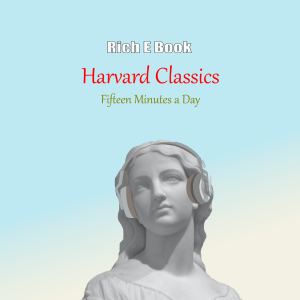
279.5K
Downloads
736
Episodes
Former President of Harvard University Charles W. Eliot wrote in his introduction to the Harvard Classics, "In my opinion, a five-foot shelf would hold books enough to give a liberal education to any one who would read them with devotion, even if he could spare but fifteen minutes a day for reading." Here you are, you can easily listen to his entire 15-minutes-a-day study guide while commuting to and from work (most of us spend far more than 15 minutes a day commuting each day), doing mundane work in the office, washing dishes at home, or doing most of the things day in and day out. It is so easy, so entertaining, and so educational that they can be listened to again and again, until they permeate into our own thinking and into our characters. Perhaps, in one year's time, you will become someone you barely recognize, all for the better. Who knows?
-- Rich E Book
Former President of Harvard University Charles W. Eliot wrote in his introduction to the Harvard Classics, "In my opinion, a five-foot shelf would hold books enough to give a liberal education to any one who would read them with devotion, even if he could spare but fifteen minutes a day for reading." Here you are, you can easily listen to his entire 15-minutes-a-day study guide while commuting to and from work (most of us spend far more than 15 minutes a day commuting each day), doing mundane work in the office, washing dishes at home, or doing most of the things day in and day out. It is so easy, so entertaining, and so educational that they can be listened to again and again, until they permeate into our own thinking and into our characters. Perhaps, in one year's time, you will become someone you barely recognize, all for the better. Who knows?
-- Rich E Book
Episodes

Saturday Jan 15, 2022
Introductory Note: Omar Khayyam
Saturday Jan 15, 2022
Saturday Jan 15, 2022
Introductory note on Omar Khayyam (Volume 41, Harvard Classics)

Saturday Jan 15, 2022
Rubaiyat of Omar Khayyam, by Omar Khayyam
Saturday Jan 15, 2022
Saturday Jan 15, 2022
Omar Khayyam laughed and enjoyed the good things of life. His "Rubaiyat," the most popular philosophic poem, is the best of all books to dip into for an alluring thought. (Volume 41, Harvard Classics)
"Rubaiyat of Omar Khayyam" first published Jan. 15, 1859.

Friday Jan 14, 2022
Introductory Note: American Historical Documents
Friday Jan 14, 2022
Friday Jan 14, 2022
Introductory note on American Historical Documents (Volume 43, Harvard Classics)

Friday Jan 14, 2022
The Fundamental Orders of Connecticut
Friday Jan 14, 2022
Friday Jan 14, 2022
The Fundamental Orders of Connecticut is "the first written constitution as a permanent limitation on governmental power, known in history." It is the work of the Connecticut Yankee. (Volume 43, Harvard Classics)
Fundamental Orders of Connecticut adopted Jan. 14, 1639.

Thursday Jan 13, 2022
Introductory Note: Jean Jacques Rousseau
Thursday Jan 13, 2022
Thursday Jan 13, 2022
Introductory note on Jean Jacques Rousseau (Volume 34, Harvard Classics)

Thursday Jan 13, 2022
Discourse on Inequality (Part II), by Jean Jacques Rousseau
Thursday Jan 13, 2022
Thursday Jan 13, 2022
Rousseau taught that men were not created free and equal. To substantiate his daring beliefs he traced man's history back to his primitive beginnings. For his teachings, Rousseau was forced to seek refuge in England. (Volume 34, Harvard Classics)
Jean Jacques Rousseau arrived in England, Jan. 13, 1766.

Wednesday Jan 12, 2022
Introductory Note: Edmund Burke
Wednesday Jan 12, 2022
Wednesday Jan 12, 2022
Introductory note on Edmund Burke (Volume 24, Harvard Classics)

Wednesday Jan 12, 2022
A Philosophical Inquiry (On Taste), by Edmund Burke
Wednesday Jan 12, 2022
Wednesday Jan 12, 2022
A Turkish sultan, relates Burke, when shown a picture of the beheaded John the Baptist, praised many things, but pointed out one gruesome defect. Did this observation show the sultan to be an inferior judge of art? (Volume 24, Harvard Classics)
Edmund Burke born Jan. 12, 1729.

Tuesday Jan 11, 2022
Introductory Note: Alexander Hamilton
Tuesday Jan 11, 2022
Tuesday Jan 11, 2022
Introductory note on Alexander Hamilton (The Ridpath Library of Universal Literature)

Tuesday Jan 11, 2022
The Federalist Papers (No. 1 & 2), by Alexander Hamilton, etc.
Tuesday Jan 11, 2022
Tuesday Jan 11, 2022
Hamilton organized the Treasury Department. He penned most of the Federalist papers, which were greatly influential in bringing New York into the Union --- the first step toward its eminent position in national and world finance. (Volume 43, Harvard Classics)
Alexander Hamilton born Jan. 11, 1757.
